- >>
- Birds Online – English
- >>
- General facts
- >>
- Budgie escaped – what...
Budgie escaped – what you can do
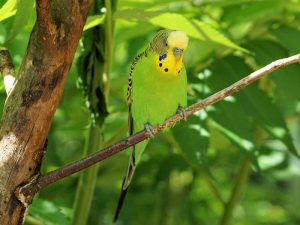
The fact that one of their feathered friends could fly away is a terrifying idea for many bird owners. But regrettably, it comes true quite often: A short carelessness or a chain of unfortunate circumstances is enough, and the bird leaves immediately – usually without looking back at the desperately calling owner. This chapter is intended to support you in the worst case so that you can take the right steps as soon as possible. It is best, however, to read this text when you are not worried about an escaped bird. If a bird just managed to escape, the clock is ticking and the owner is so excited or worried that focused reading is hardly possible. So it is better to make yourself familiar with the topic when you’re calm and relaxed.
It would be best anyway if you would not even get into the situation that one of your feathered darlings has escaped. Preventing the escape is very important, which is why I would like to give you some basic advice for prevention before the actual hints for the case of an emergency.
What you should do in advance
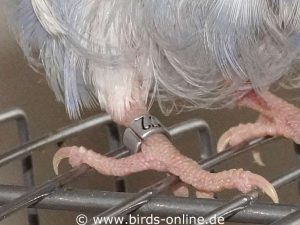
Take well-lit and sharp photos of your birds from different perspectives and save them in a place where you can find them immediately if you need them. This is important if you need to make flyers or advertisements to report that your bird has escaped.
In case your feathered friend wears a leg band, write down the letters and/or numbers you can see on it. Someone who found a bird might ask you for this “ID” to prove that you’re the true owner of the escapee.
Never act carelessly

“No need to worry, the birds are always so relaxed. While they are flying freely around the house I can open the window just a little bit or go to the balcony. The birds won’t escape anyway.” I often hear talk like this – and just as regularly I am told: “My bird suddenly flew away, he/she has never done that before! I’m shocked!” Here in Germany, we have a proverb that means “one time is always the first time”. So it happens without any warning and a bird escapes through the tilted window, although your little fellow has never been attracted by the window before.
The uncomfortable truth is: Anyone who has birds in free flight and knowingly opens unsecured windows or doors, even if only for a few seconds, is acting carelessly. Many birds pay for this thoughtlessness of their owners with their lives when they fly away and die outside before being found and caught.
Please always keep in mind that a bird in free flight can even escape through a tiny window or door gap, although it has never been approaching it before. It can happen, for example, that the bird is frightened and accidentally flies towards the gap. Or the budgie suddenly becomes curious. Then your feathered friend inspects the gap and by doing so escapes outside. To quote another proverb: Never say never!
It is also very important that you always keep an eye on small children. Maybe they suddenly open a door through which a bird can fly into another room where a window is open. No matter how well you explain it to your children, they may forget the bird just for a few seconds. And this is all it takes. Make sure you secure the windows and doors always so that birds cannot accidentally escape.
Secure windows, doors and cages or aviaries
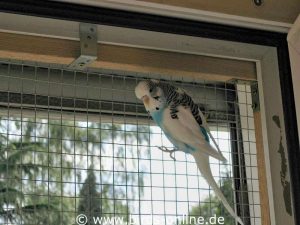
If you do not want to lock your birds in while you are ventilating your rooms, you should put a protective grille on the window – but not one for cats. Small birds like budgies could slip through the bars. And if you are skilled, you can build such a grille yourself from sturdy, zinc-free material or you can contact a professional who builds aviaries. Those experts can build perfect custom-made window grilles.
Doors should also be secured, which is usually best done through locks. This means that if your birds fly freely in one room and you are airing in other rooms, a hallway can serve as a gate, for example. Before you go into one of the rooms with an open window, leave the free flight room, close the door behind you, go through the hallway and only then open the door to the room with an open window. Well, of course only if no bird has followed you. In case your birds fly freely in a room that has a balcony door, this door should be kept strictly closed while the birds are outside their cage or aviary.
If you have a balcony door that can be opened from the free-flight room and you also have little children living in your home, you should install a lockable handle on the door. Lock the balcony door and take the key with you so that your kids cannot accidentally open the door and one of your birds can fly away. Securing balcony doors with a grille instead is usually far too impractical; locking the door handle is easier to do.
Also remember to secure aviaries and cages so that doors do not open or hanging food trays fall down and expose openings while you are ventilating. Bathing boxes, such as those available in pet stores, can also fall down when the cage doors are open and allow the birds to escape.
Parrot recall training
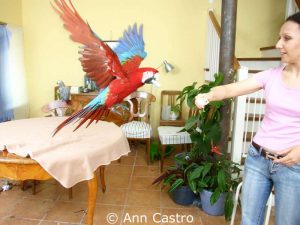
You can train certain behaviors with your parrots, parakeets, and some other smart bird species. One of these tasks is to fly back to a person when being called. Many owners use the phrase “come here” on this occasion as a command and lift an arm so that the bird can land on it. Parrot behavior consultants and trainers can give you advice on how to train best with your birds. If the training works well, the birds will soon learn to be called by their owner and fly towards you.
If you train in your home, you should also include a higher level of difficulty: You should call your bird from another room while your feathered friend cannot see you. This is important because if a bird escapes, he or she may be in a place where you hear the animal call but you can’t see it. Probably your bird will not be able to see you, too, but hearing you is possible. Then it is helpful if the bird is trained to fly to where your voice comes from, even if your little fellow can’t see you at first.
But please note: Even if your bird has successfully completed the recall training and flies to you reliably in a familiar environment, this is no guarantee that it will work outdoors in a stressful situation. Avoiding an escape should therefore always have the highest priority.
That’s how most escaped budgies behave
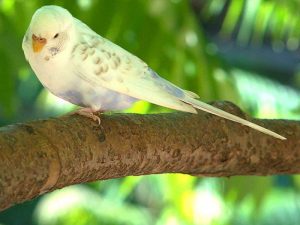
Like many other parrot species, wild budgies live as nomad-birds in Australia. Provided that they don’t breed, they roam enormous areas in big flocks always in search of food, water, and often suitable nesting places. They usually orientate themselves at the locally prevailing environmental conditions on that occasion and avoid too dry or otherwise inhospitable regions. In order to be able to survive as nomad-birds, wild budgies have an outstanding flight capability. So they’re able to fly long distances easily just checking out the surrounding. An escaped pet budgie has the same instincts and therefore will behave according to this scheme.
Unlike runaway cats, who often like to be in a preferred territory around their home, escaped budgies usually don’t look back and fly in any direction that suits them. They’re able to move far away from the former home within the shortest time. Because they get frightened after the escape, many birds perch close to their home at first. But they don’t recognize their home from this unknown perspective. Outside everything looks completely different than seen from indoors.
If an escaped bird is scared, if strong wind touches it or if it simply feels like flying, it loses sight of its home within a few seconds and thus any reference to the bird owner, whom the little escapee may have watched from a tree until then. Budgies have no innate instinct for a safe homecoming, as for example carrier pigeons have. Instead, budgies explore the surroundings without proceeding purposefully. Therefore it can hardly be predicted, where an escaped budgie will fly.
Possibly, shortly after the escape, a bird will stay in a radius of up to one kilometer around its home. However, it is more likely that the budgie will soon start looking for food and move further and further away from home. To find or even catch an escaped bird is an extremely difficult task. In some cases, escaped budgies have been picked up 50 kilometers away from home after just three or four days! This underlines how well these small parrots can fly even though they have been living as pets in a house before. Only untrained or extremely over-weighty budgies will not be able to fly that far. Most of these birds are capable of flying distances just up to 2 kilometers or so.
Chances of survival of escaped budgies

For many owners of escaped birds, the uncertainty about the fate of their protégés is hard to be bear. Over and over again, they ask themselves whether budgies are able to survive out there in general and how long they can endure. There is no universal answer because it depends on many different criteria. If the weather is bad with low temperatures and much rain, an escaped budgie will survive just a few days in the wild – or even less. At temperatures below freezing point and with a thick layer of snow, the bird will most likely not even survive the first night outdoors.
During the summer and autumn, the chances for escaped birds are best. Nature usually provides enough food, unless there hasn’t been a period of drought. And it’s helpful for the pet birds to know the local edible food like berries and seeds. Budgies who never have been served something fresh from nature before will struggle with finding food. If a budgie has been fed for example on native grasses, the bird will quickly adapt to the conditions in nature and will recognize the seeds as food.
Because of the usually sufficiently large quantities of available food and the moderate temperatures in the summer and early autumn, in Central European nature budgies can theoretically survive for several weeks. Regrettably, it happens likewise that an escaped budgie eats something inedible or harmful and dies of a poisoning.
In case you now wonder how chances are for escaped budgies in spring, you should keep in mind that nights can still be cold then. Besides this, in early spring there is not yet too much suitable food for budgies out there. So it is often more difficult for them to survive outside during this season than in summer and autumn.
By the way, in some European cities, small flocks of escaped budgies join together in parks in summer occasionally or they join house sparrows. The birds act wisely because as a member of a flock, they are considerably less threatened by predators as if they would make their way alone. A budgie roving without type-mates is constantly threatened by birds of prey, cats, and other carnivores. The risk of being hunted by a predator is very high for escaped budgies during the whole year. If they know cats from their home and they don’t fear them, escaped birds are in extreme danger. While feeding on the ground, they will not react properly in case a cat approaches – and this is why many escaped budgies from households with cats are killed by those animals outside.
In populated areas with densely trafficked roads, several escaped pet birds are hit by cars. Unlike our native wild birds, they have no experience with road traffic and therefore unfortunately many of them collide with cars or trucks.
First measures after the escape
Some budgie escapes outside when the owner is nearby. If your parakeet escaped and still perches outdoors quite close to your home, for example in a tree or shrub, it may well be possible to catch the bird. However, it is important that you do not frighten your feathered friend in any way and that you do not cause him or her to fly away in panic. Avoid any sudden movements or screams and never throw objects like a towel in your bird’s direction. You should rather talk to the budgie in a calming way and lure him or her with the favorite food or direct your bird to you with the recall command that you may have practiced before.
With birds who didn’t undergo such a recall training, a decoy bird is often the best way to catch them again. Take the mate of your bird or another feathered friend he or she knows outside in a securely locked cage. If this bird calls its escaped companion, with a little luck he or she will be attracted and come to the cage. If the escaped bird actually sits there, you should go back into the house very carefully. Only when you are inside – for example in the hallway – is it advisable to grip the escaped bird with your hand or catch the animal with a brailer. If you’re indoors and you don’t manage to grip your bird properly, he or she will just fly around the house. You can try to catch the bird again later. But in case you try it outside and don’t succeed, your budgie will most probably fly away. So you should better not try catching your little friend outside!

Sometimes the escaped bird is too far away from home or you cannot bring another pet bird to where he or she is. Then you should take an empty cage outside and try to lure your bird with food and the calls of its partner or conspecifics. You can play these calls loudly with your cell phone. All you have to do is record the calls beforehand or download them from the Internet – and you’ll always have them at hand in case you need them in an emergency.
Please do not follow the advice given in some places to soak a budgie sitting in the branches with a garden hose. For so small birds like budgies, the water jet is usually too strong, so it could hurt or even kill them. In addition, many birds are scared in a situation like this and the water jet makes them fly away long before their plumage is soaked. The idea of making them unable to fly by soaking their plumage therefore usually won’t work in reality.
Capturing your escaped bird did not work – what to do next?
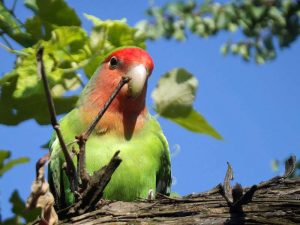
If your budgie has disappeared from your sight, it is important to search for your feathered friend systematically. Inform as many people as possible that your budgie has escaped. Get supporters among your friends and family. Those people can assist you while you are searching for your bird outside. And they can also help you to spread information. You or one of your helpers should immediately place advertisements in daily newspapers in your home town and in the surrounding cities. You should also place an ad in the online edition of your local newspaper or a similar medium, or look for such an ad, because a person who found your bird may have published it in order to get in touch with you.
In addition, you should always notify the local animal shelter as well as those of the immediate neighboring towns and report your bird there as missing. Sometimes, people who found a pet bird contact the police, the fire department, veterinarians or even pet stores and tell them about the animal. So you should also ask those people – maybe they have heard about your bird. Just try it even though chances aren’t always very high. After all, it is not impossible either.
You should place flyers close to your house to indicate that a bird has escaped. It is important that a photo of your budgie is shown on the flyer so that he or she can easily be identified. It is very helpful to offer a reward which should be as high as possible. Why? Quite simply: It might happen that you think the owner could have been more careful, in order to prevent such a lovely creature from getting into danger. And already you would have decided not to return the bird …If a high reward is promised, this may convince the person who found your bird to give him or her back, anyway.
In social networks such as Facebook, there are groups and pages where people can report birds who have escaped or who have been found outside. Be sure to look around there! If you are not active there yourself, someone from your family or a friend may be able to help you.
We can only hope that you will get your escaped bird back. But always be aware that the chances are unfortunately not very good in many cases. Be emotionally prepared for the fact that there is a relatively high probability that you will never see your beloved bird again. Nevertheless, I wish you from the bottom of my heart that you and your escapee are lucky and will be reunited very soon!
